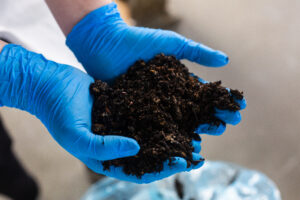You Are What You Eat: Supply Chain Transparency in the Food System
In the US television show, Portlandia, there is an episode in which several diners at a restaurant start asking about the dishes, the condition the chickens were raised in, the names of the chickens, and ultimately leave the restaurant to visit the farm where the chickens were raised. While this comedic license may go a bit far, the availability of sensors, blockchain, and data analytics, combined with food service and customer requirements, can improve safety and accountability throughout the food chain. Traceability is no longer a request, but a demand and a challenge with growing complexity.
According to the National Restaurant Association, Americans spend over $700 billion a year at restaurants every year. On the food safety side of things, Food Safety Magazine counted over 620 food safety recalls in 2015 due to contamination, with each recall costing around $10 million. Globally, food-borne pathogens cost around $55 billion a year.
Chipotle’s challenges with food safety in 2015 and 2016, which have damaged its revenues (-23% in July 2016), have been connected to E. coli. The company’s response? Working with suppliers (large contract and multiple local growers) to enhance traceability and validation. Chipotle’s partnership with FoodLogiQ to trace ingredients has been a key element. They are also working on solutions that sense the ripeness of avocados, one of their main quality issues.
In addition, HarvestMark, which also provides a traceability Software-as-a-Service (SaaS) solution, was acquired by Trimble Corporation. Known for its advanced location-based solutions, HarvestMark has been actively filling gaps along the food supply chain, linking the farmer to the retailer and beyond.
Food Supply Chain/Food Safety Start-ups

Another growing issue is fraud in the food supply chain – from false use of ecolabels to counterfeit food and drink. OPSON V, a joint Europol-INTERPOL operation that spanned across 57 countries over a 4-month period (Nov 2015 – Feb 2016), led to the largest ever seizure of fake products. The results: a seizure of 11,000 tons and 1,440,000 liters of hazardous fake food and drink. Michigan State University estimates food fraud to account for over $30 billion annually.
Marbelize, an Ecuadorian tuna processor that sells almost 50,000 tons of fish a year under 950 brands, uses Frequentz to manage traceability and to stay clear of allegations of illegal fishing operations. This starts with a tablet on the fishing boat and follows through the chain of custody to restaurants and processors. Frequentz is reportedly evaluating the incorporation of DNA testing of the seafood to generate a deeper level of traceability.
In another example of combating food fraud, the 2013 horse meat scandal in the UK led to the launch of arc-net, a blockchain-based platform that creates a unique identifier for every asset along the chain of custody, with an emphasis on the security of the data, along with transparency and auditability. arc-net will participate in the EU-China-Safe project, a joint European Horizon 2020 and Chinese Ministry of Science and Technology program that will address food fraud and food safety. This program includes 15 European partners and 18 Chinese partners.
arc-net has also been selected for Terra, an accelerator funded by Rabobank and RocketSpace for food and ag tech start-ups. Another food chain-focused blockchain company in the same cohort is San Francisco-based Ripe.io, which claims to use sensors and algorithms along with blockchain technology for recordkeeping and transparency throughout the food supply chain.
Going beyond logging, labeling and sensors, SafeTraces is providing a biological food marker using DNA sequences from seaweed. These unique markers are applied via existing washing systems, essentially spraying on DNA bar codes, and can be used to trace the origins of food, detect food adulteration, and other track other relevant data. SafeTraces has received both grants from US Food and Drug Administration and a $1.5 million private investment in August 2016 from Maumee Ventures, the capital arm of diversified agriculture company, The Andersons.
While getting up from the table to check the care and feeding of chickens about to be served for dinner is an entertaining television skit, today’s innovators have made it much simpler to trace agricultural and food products from their origin to the table.


